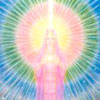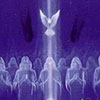Shedding Light On War, Peace, And The Brotherhood Of Man
 by James Allen
by James Allen
When a man enters a dark room he is not sure of his movements, he cannot see objects around him, or properly locate them, and is liable to hurt himself by coming into sudden contact with them. But let a light be introduced, and immediately all confusion disappears. Every object is seen, and there is no danger of being hurt. To the majority, life is such a dark room, and their frequent hurts—their disappointments, perplexities, sorrows and pains—are caused by sudden contact with principles which they do not see, and are therefore not prepared to deal with. But when the light of wisdom is introduced into the darkened understanding, confusion vanishes, difficulties are dissolved, all things are seen in their true place and proportion, and henceforth the man walks open-eyed and unhurt, in the clear light of wise comprehension.
War And Peace
War springs from inward strife. “War in heaven” precedes war on earth. When the inward spiritual harmony is destroyed by division and conflict, it will manifest itself outwardly in the form of war. Without this inward conflict war could not be, nor can war cease until the inward harmony is restored.
War consists of aggression and resistance, and after the fight has commenced both combatants are like aggressors and resisters. Thus the effort to put an end to war by aggressive means produces war.
“I have set myself stubbornly against the war spirit,” said a man a short time ago. He did not know that he was, by that attitude of mind, practicing and fostering the war spirit.
To fight against war is to produce war. It is impossible to fight for peace, because all fighting is the annihilation of peace. To think of putting an end to war by denouncing and fighting it is the same as to try to quench fire by throwing straw upon it.
He, therefore, who is truly a person of peace, does not resist war, but practices peace. He, therefore, who takes sides and practices attack and defense is responsible for war, for he is always at war in his mind. He cannot know the nature of peace, for he has not arrived at peace in his own heart.
The true man of peace is he who has put away from his mind the spirit of quarreling and party strife, who neither attacks others nor defends himself, and whose heart is at peace with all. Such a man has already laid in his heart the foundations of the empire of peace; he is a peacemaker, for he is at peace with the whole world and practices the spirit of peace under all circumstances.
Very beautiful is the spirit of peace, and it says, “Come and rest.” Bickerings, quarreling, party divisions—these must be forever abandoned by him who would establish peace.
War will continue so long as men will allow themselves, individually, to be dominated by passion, and only when men have quelled the inward tumult will the outward horror pass away.
Self is the great enemy, the producer of all strife, and the maker of many sorrows. He, therefore, who will bring about peace on earth, let him overcome egotism, let him subdue his passions, let him conquer himself.
Brotherhood Of Man
There is no lack of writing and preaching about “universal brotherhood,” and it has been adopted as a leading article of faith by many newly formed societies. But what is so urgently needed to begin with is not universal brotherhood, but particular Brotherhood. That is, the adoption of a magnanimous, charitable, and kindly spirit toward those with whom we come in immediate contact; toward those who contradict, oppose and attack us, as well as toward those who love and agree with us.
I make a very simple statement of truth when I say that until such particular brotherhood is practiced, universal brotherhood will remain a meaningless term. For universal brotherhood is an end, a goal, and the way to it is by particular brotherhood. The one is sublime and far-reaching consummation, the other is the means by which that consummation must be realized.
I remember on one occasion reading a paper devoted largely to the teachings of universal brotherhood, and the leading article—a long and learned one—was an exposition of this subject. But on turning over a few more pages, I found another piece by the same writer in which he accused of misrepresentation, lying, and selfishness, not his enemies, but the brethren of his own society, who bear, at least as far as such sins are concerned, stainless reputations.
A scriptural writer asked the question, “If a man does not love his brother whom he has seen, how can he love God whom he has not seen?” In the same manner, if a man does not love the brother whom he knows, how can he love people of all creeds and all nations whom he does not know?
To write articles on universal brotherhood is one thing; to live in peace with one’s relations and neighbors and to return good for evil is quite another.
To endeavor to propagate universal brotherhood while fostering in our heart some sparks of envy, spite, and resentment, malice, or hatred, is to be self-deluded; for thus shall we be all the time hindering and denying, by our actions, that which we eulogize by our words. So subtle is such self-delusion, that, until the very heights of love and wisdom are reached, we are all liable at any moment to fall into it.
It is not because our fellow men do not hold our views, or follow our religion, or see as we see that universal brotherhood remains unrealized, but because of the prevalence of ill will. If we hate, avoid, and condemn others because they differ from us, all that we may say or do in the cause of universal brotherhood will be another snare to our feet, a mockery to our aspirations, and a farce to the world at large.
Let us, then, remove all hatred and malice from our hearts. Let us be filled with goodwill toward those who try and test us by their immediate nearness. Let us love them that hate us, and think magnanimously of those who condemn us or our doctrine—in a word, let us take the first step toward universal brotherhood, by practicing brotherhood in the place where it is most needed. And as we succeed in being brotherly in these important particulars, universal brotherhood will be found to be not far distant.
Excerpt from Light On Life’s Difficulties
Posted in Other Topics, Self-help, Spiritualitywith comments disabled.





